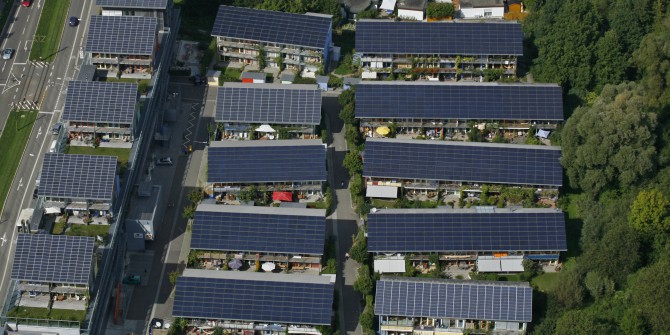
Why do we observe climate-friendly behaviour?
From an economic perspective, it is particularly hard to explain why people, and countries, engage in pro-environmental behaviour. Even more so when it comes to climate-friendly behaviour. Since its benefits are enjoyed worldwide, regardless of who shoulders its burden, why not simply free riding on the efforts of others?
Yet, people purchase hybrid cars, solar panels, green energy programs, carbon offsets. Policy-makers and practitioners alike are interested in understanding why people make these ‘green’ decisions. New research has developed in recent years, which provides evidence of particular examples of green behaviour. A new study reviews it and contributes to explain why people cooperate in the ‘climate commons’, linking such behaviour to local social norms. Deep, cultural, differences in social norms matter, but policy-makers and practitioners are not powerless. Social norms may be hard to modify, but good ones can be made more visible with relatively little effort. That is, social interventions can increase cooperation in the climate commons.
Rational fools
Explaining human behaviour has always been a challenge for social scientists. Economists have traditionally preferred, on very justifiable grounds, to simplify economic behaviour at the cost of missing part of its complexity. This trade-off was well captured by John Stuart Mill, who referred to “an arbitrary definition of man, as a being who inevitably does that by which he may obtain the greatest amount of necessaries, conveniences, and luxuries, with the smallest quantity of labour and physical self-denial with which they can be obtained.”
Others, such as Nobel laureate Amartya Sen, criticised the narrowness of the economic man portrayed by the then-dominant rational choice theory. In particular, he famously exposed the illogical extremes to which self-interested rational “fools” would go in the following passage, concerning an encounter between two strangers: “Where is the railway station?” he asks me. “There,” I say, pointing at the post office, “and would you please post this letter for me on the way?” “Yes,” he says, determined to open the envelope and check whether it contains something valuable.
The emergence of behavioral economics contributed to explain some of the economic puzzles observed in the real world. One of these puzzles concern the ability of some local communities to manage common pool resources without incurring into excessive use and rapid depletion. Another Nobel laureate, Elinor Ostrom, collected evidence from many situations of successful cooperation in managing local resources, and in this way challenged the economic prediction of inevitable free riding. According to Ostrom, cooperative outcomes can be sustained if community members trust each other and trust is maintained through monitoring and sanctioning of norm violators. In her influential book, she provided evidence that Hardin’s prediction of commons ending in tragic overexploitation in the absence of markets (privatisation) or coercion (government intervention) need not materialise, in particular in the presence of norms, informal institutions and communication opportunities.
But what about global dilemmas? Can cooperation scale up to the global level? Climate-change mitigation presents the toughest conditions for the emergence and stability of cooperation. Ostrom’s body of work provides useful lessons on how to govern local commons. It is however silent, at least at a first glance, on how to manage global dilemmas. Can we identify an escape route from the tragedy of the commons in global dilemmas such as climate change mitigation?
I choose green if I see you going green
The next challenge for behavioural and environmental economists is to explain cooperative behaviour in the climate commons. How can one do that? Well, a good starting point is always to look at common patterns and stylised facts. Here are a few examples (see the original study for a comprehensive survey).
- Peer effects drive the adoption of green technologies
Why do we see many more solar panels in some areas than others, despite similar economic and environmental characteristics? The answer lies in social contagion. Solar panels are very visible, and people are likely to notice if their neighbours opted for such environmentally friendly technology, as well as to learn from their experience. Observability, and the inclination to be more likely to adopt a behaviour the more widespread it is, facilitate behavioural cycles such that once enough individuals have made a choice, it will rapidly diffuse.
Peer effects measure the intensity of this phenomenon of localised social contagion, and explain observed snowball effects past a critical tipping point. Does social contagion help spread the adoption of other technologies, such as hybrid cars?
It appears to be the case for the Toyota Prius, data for California show, but not for the Honda Civic Hybrid. What is wrong with the Honda Civic Hybrid? Well, that it looks like a standard Honda Civic. People go green when they see others going green.
- Social interventions can make visible otherwise invisible social norms
What if the social norm is not visible? Is there room for social contagion?
Yes, if social interventions are targeted at making the norm visible. Examples from energy conservation suggest that people are ready to reduce their energy consumption once they realise that they consume more than their neighbours. Furthermore, with careful design these behavioural interventions do not backfire: individuals consuming less than their neighbours continue to do so.
The bad news? Social interventions are not commonly used, even if they could be very cost-effective. Many pro-social behaviours are still largely invisible to the local community, creating an impediment to social rewards. Invisible behaviors may be less appealing, and thus their potential is likely to go underexploited.
- Beliefs and cultural aspects of cooperation drive behaviour, absent visible social norms
And what explains pro-environmental behaviour when the norm is not (made) visible?
In this case, beliefs and cultural traits related with cooperation seem to explain why people in some societies are more likely to engage in climate-friendly behaviour. While deep cultural elements such as generalised trust are very persistent over time and beyond the reach of policy-makers and practitioners, at least in the short run, their linkages with pro-environmental behaviour, and with the behaviour of countries with respect to climate change mitigation, are very intriguing and stimulating from a research perspective.
Bottom line
The take-home message from our research so far: climate-friendly behaviours may not be so different from other cooperative behaviours related with local social dilemmas. Local social norms are still crucial. A non-negligible portion of individual contributions to climate change may indeed be the result of people providing global benefits while adjusting to local norms. That is, sometimes people think locally, and end up acting globally.
Both authors and their colleagues at the Grantham Research Institute on Climate Change and the Environment spend part of their research devising social interventions aimed at increasing pro-environmental behaviour in a wide range of settings, cooperating with different partners from the private sector. Contact at S.Carattini@lse.ac.uk and A.Tavoni@lse.ac.uk.
♣♣♣
Notes:
- This blog post is based on the authors’ paper Cooperation in the climate commons, LSE’s Grantham Research Institute on Climate Change and the Environment, Working Paper 259.
- The post gives the views of its author, not the position of LSE Business Review or the London School of Economics.
- Featured image credit: Solar settlement, by Andrewglaser (talk), under a CC-BY-SA-3.0 licence
- Before commenting, please read our Comment Policy.
 Stefano Carattini is Postdoctoral Fellow at Yale University and Visiting Fellow at the LSE’s Grantham Research Institute on Climate Change and the Environment. His research focuses on the political economy and effectiveness of environmental policy. He has worked on waste and carbon taxation as well as more broadly on cooperation in the climate commons and the diffusion of climate policy. For his research he was awarded the 2015 Heinz König Young Scholar Award by the Mannheim Centre for European Economic Research, ZEW.
Stefano Carattini is Postdoctoral Fellow at Yale University and Visiting Fellow at the LSE’s Grantham Research Institute on Climate Change and the Environment. His research focuses on the political economy and effectiveness of environmental policy. He has worked on waste and carbon taxation as well as more broadly on cooperation in the climate commons and the diffusion of climate policy. For his research he was awarded the 2015 Heinz König Young Scholar Award by the Mannheim Centre for European Economic Research, ZEW.
 Alessandro Tavoni is Assistant Professor (recently promoted to Associate Professor) in the Grantham Research Institute at the London School of Economics and Political Science, where he leads the International Environmental Negotiations Programme. He is also Associate Researcher at Fondazione Eni Enrico Mattei and a Levin Lab member at Princeton University. He specialises in applied game theory, with particular attention to behavioural and political economy constraints to the provision of environmental goods.
Alessandro Tavoni is Assistant Professor (recently promoted to Associate Professor) in the Grantham Research Institute at the London School of Economics and Political Science, where he leads the International Environmental Negotiations Programme. He is also Associate Researcher at Fondazione Eni Enrico Mattei and a Levin Lab member at Princeton University. He specialises in applied game theory, with particular attention to behavioural and political economy constraints to the provision of environmental goods.





